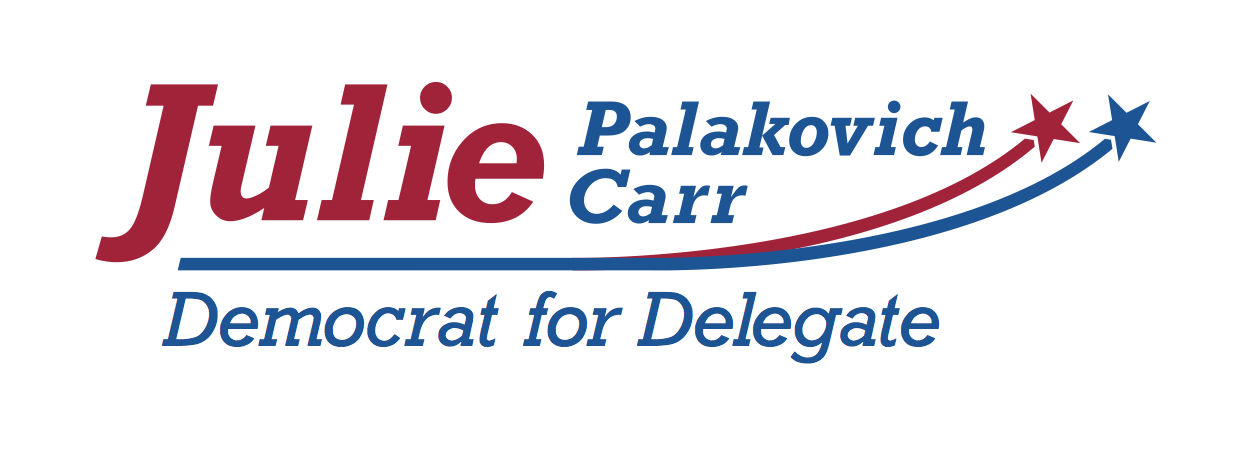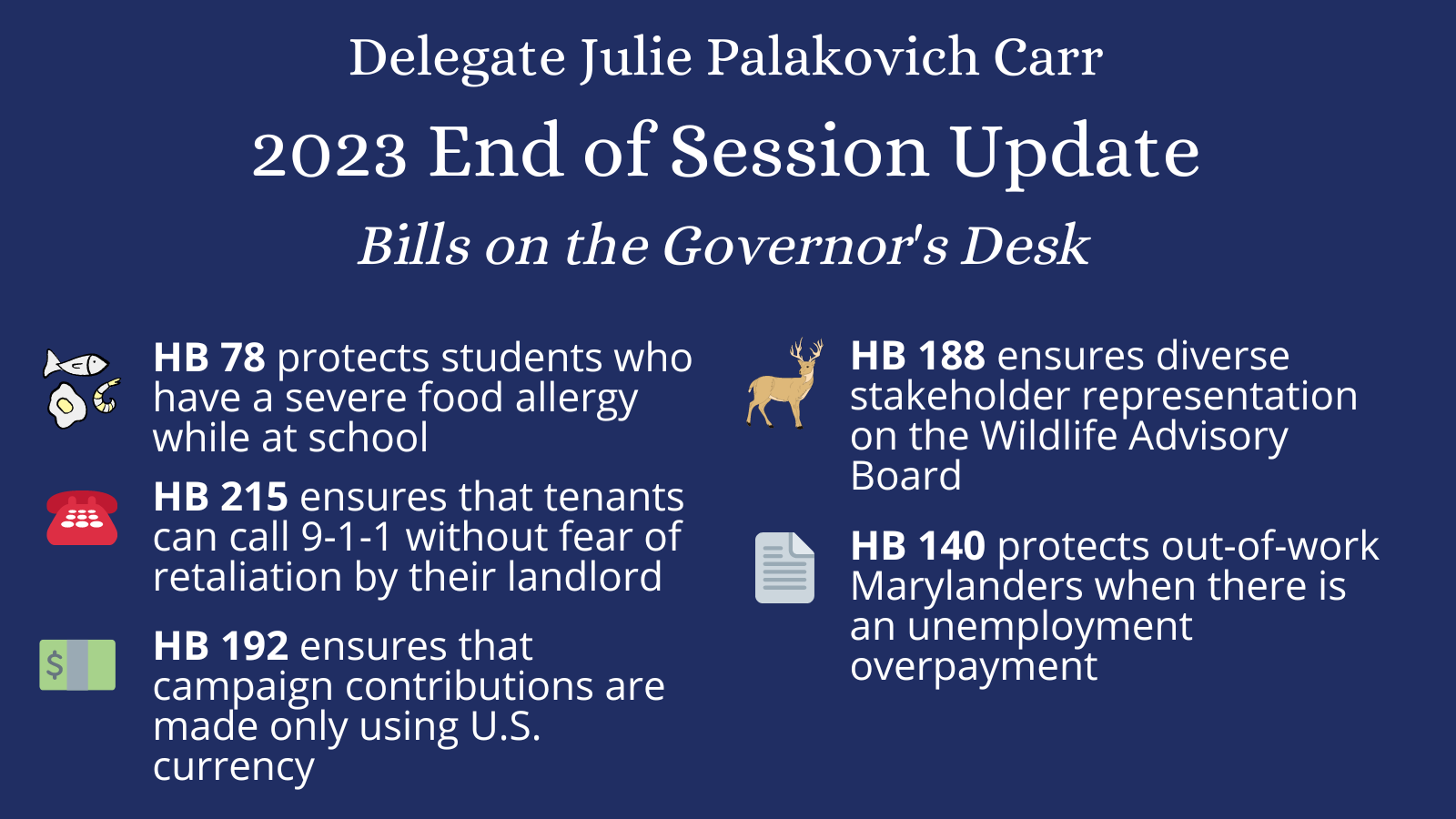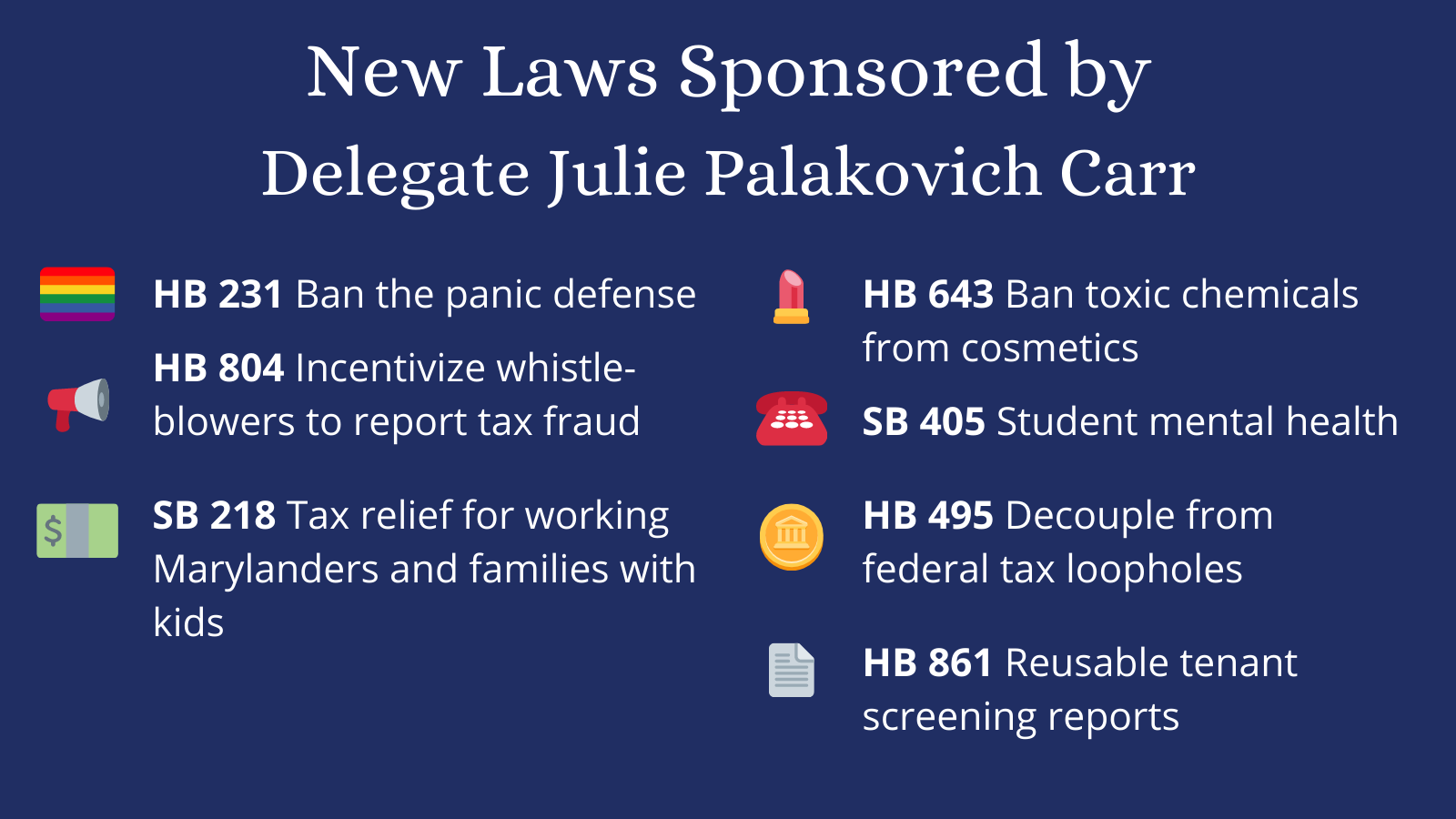Dear resident of District 17,
Given the ongoing public health crisis, I know that the legislative outcomes of the 2020 session of the Maryland General Assembly is not at the forefront of people’s minds. Consequently, I’ve debated about whether or not to write a traditional end of session letter. In the end, I feel that the need to share information about our state legislature’s deliberations and actions is still warranted. I hope that my compilation of Maryland’s successes is a welcome distraction.
Public Health and Healthcare
The General Assembly passed emergency legislation that allows the Governor to transfer up to $50 million from the state’s Rainy Day Fund to address the COVID-19 outbreak. An additional $100 million was included in the budget we passed to support small business and reopen hospitals.
Another bill we passed allows the Governor to expand healthcare coverage, unemployment benefits, and consumer protections during the COVID-19 public health emergency. Co-pays and other out-of-pocket costs for COVID–19 testing and immunization will be eliminated. To prevent hospitals and doctors’ offices from becoming overwhelmed, certain telehealth protocols for COVID–19 will be waived to allow more patients to be diagnosed and treated over the phone and online. In partnership with the federal government, the state is providing unemployment insurance benefits to workers who are temporarily out of work or quarantined due to COVID–19.
We also enshrined key provisions of the Affordable Care Act into state law, including allowing young adults to stay on their parents' plan until they turn 26, eliminating co-pays for certain preventive services, prohibiting health insurance companies from limiting how much they would pay for any individual’s medical bills over a lifetime, and expanding coverage for individuals with pre-existing conditions.
Several other public health bills were passed this year, including actions to drive down the cost of prescription drugs, requiring hospitals to provide free medically necessary care to a broader group of Marylanders, providing coverage for in vitro fertilization for unmarried women, requiring schools to administer medical cannabis to students with a prescription, and requiring implicit bias training for medical professionals.
An effort to ban the sale of flavored cigarettes and vaping products passed the House but stalled in the Senate.
Improving Education
The Blueprint for Maryland’s Future, a historic education reform effort based on the recommendations of a blue ribbon panel, passed both chambers. This is a monumental win for Maryland’s children and future economic growth. It’s built on the principle that every child deserves the best education regardless of their zip code. This legislation will transform the state’s early childhood, primary, and secondary education system into a world-class system.
Investments are focused on:
Expanding full-day prekindergarten for low-income 3 and 4 year olds and providing more family support centers in high-poverty areas;
Hiring and keeping high-quality, diverse teachers by paying teachers a salary comparable to other professions, providing more rigorous teacher preparation programs, and implementing career ladders to provide additional opportunities for career advancement;
Raising the standards for college and career readiness to prepare students for the jobs of tomorrow;
Providing more resources for the students who need them most; and
Implementing an accountability board to monitor progress and ensure tax-payer funds are being used effectively.
We also passed the largest one-time investment in school construction in Maryland history. This bill invests an additional $2.2 billion into school construction, on top of current state funding ($400 million per year). It will help counties across the state build new schools and jumpstart much needed maintenance projects. Montgomery County will receive an additional $55-$60 million in FY 2021 as a result.
Other education bills that passed: a dedicated fund to put the state’s four historically black colleges and universities on the same par as other universities, expansion of Maryland’s promise of free community college, transparency for college students for which courses use free or low cost textbooks, creation of a state ombudsman for special education, and prohibiting lunch shaming of students for unpaid meal debt.
I am hopeful that other education bills that passed one chamber this year will get across the finish line next year, including prohibiting schools from charging fees for summer school, providing free menstrual products in school bathrooms, and giving the Montgomery County Inspector General oversight authority over public schools.
Blueprint Revenues
The first several years of the Blueprint for Maryland’s Future are already fully paid for. For future years, a sizable amount of funding is already committed to the Education Trust Fund because of required contributions by Maryland casinos and from a dedicated portion of taxes collected from online, out of state marketplace facilitators (e.g. Ebay and Amazon).
In addition, a package of revenue generating bills was considered this legislative session, including closing corporate tax loopholes, increasing the tobacco tax, legalizing sports betting, and taxing vaping products, digital products (e.g. music, videos, and apps), online advertising, and services. Ultimately, we only passed taxes on tobacco, vaping, digital products, and online advertising.
One of my major focuses this session was cleaning up ineffective tax credits. I was part of a select work group that reviewed business tax credits; our initial recommendations passed the House but not the Senate. We will continue our work over the interim and come back next year with additional legislation. Meanwhile, my bill to clean up the Opportunity Zone Enhancement Tax Credits was passed; this measure will save the state $400,000 a year. Another of my successful bills provides for an online database of state-funded economic incentives to ensure transparency.
Closing corporate tax loopholes was another focal point for me this session. Although most bills did not get traction, a few passed just the House, including my bill to save $16 million a year by decoupling from federal tax breaks for wealthy investors in opportunity zones. Another notable bill passed by the House would have ended two accounting tricks used by corporations that result in companies not paying their fair share of taxes.
Economic Growth
The General Assembly passed several bills to foster economic growth. Of special interest to the biotech corridor are two bills to assist small businesses that engage in research or technology development with applying for and leveraging federal Small Business Innovation Research grants and Small Business Technology Transfer grants.
This November, voters will have the opportunity to weigh in on a ballot referendum to legalize sports betting, which could generate roughly $20 million a year for the state.
New protections for workers were passed, including a prohibition on an employer taking adverse actions against an employee for inquiring about their wages. Several other bills passed only one chamber, including a prohibition on employers using past salary history to determine an employee’s wages, an extension of the time frame to file a discrimination complaint, and an expansion of paid leave to include bereavement.
Environment
Protecting the environment and making progress on climate change continue to be central goals of the General Assembly. This year, we passed bills to ban the use of the pesticide chlorpyrifos and the sale of mattresses and furniture that contain more than 0.1% flame-retardant chemicals; both of these bills will improve public health by preventing exposure to Marylanders to known dangerous substances.
Other environmental protection bills only passed one chamber and could return next session, including lowering the acceptable level of lead in drinking water at schools, banning plastic bags, creating a pilot program for renewable energy choice in Montgomery County, reducing greenhouse gas emissions from food, making state buildings less averse to birds, and banning wildlife killing contests.
Equity
Maryland is a diverse state and it’s important that our laws reflect our diversity. This year, we repealed sodomy as a crime. Police will be required to receive training to recognize and respond to a hate crime and another bill makes the display of hate symbols like a noose or swastika on another person’s property a hate crime. Additionally, we expanded the definition of hate crime to include acts that were motivated in whole or in part because of bias. We also passed a prohibition on discrimination based on natural hairstyles such as braids and afros. New hotels will be required to have beds in their accessible rooms that accommodate a bed lift.
Among the bills that passed only one chamber was my bill to prohibit the use of the LGBTQ panic defense, a legal strategy that asks a jury to find the defendant not guilty of a violent crime because of the victim’s sexual orientation or gender identity. The House amended the bill to include racial motivations as well. Other bills passed by the House but not the Senate include a prohibition on dicrimination by private schools that take public funding and the creation of a state LGBTQ+ Affairs Commission.
I continue to be an active affiliate member of the Latino Caucus and was named Vice Chair of its Legislative Review Committee. It’s an honor to serve in this capacity given the diversity of my district.
Transportation
Access to reliable, affordable, and safe transportation continues to be a focal point for me as a member of the Public Transit Caucus. The legislature passed three notable transportation bills: a pilot program for extending MARC commuter train service into Northern Virginia, requiring pedestrian safety planning for construction projects near a mass transit station, and allowing drivers to pass a bicyclist by driving on the left side of the road in a no-passing zone.
Among the bills that passed one chamber but didn’t become law is one of my bills, which would have required the state to study the expansion of commuter bus service from Frederick and Montgomery Counties into Northern Virginia. Other bills passed by just the House include addressing the funding shortfall for the Maryland Transportation Authority, requiring a pedestrian safety plan for newly constructed schools, and requiring the state to transition to all electric buses.
Unfortunately none of the reforms proposed for the 270/495 highway widening project will become law this year. Three bills passed the House, including legislation to codify the promises made by the Administration, reform public-private partnerships, and require the Board of Public Works to approve new tolls.
Elections and Ethics
Many pro-democracy bills were introduced in advance of this year’s elections. My bill to rename ‘absentee ballots’ to ‘mail-in ballots’ was amended before final passage to include Senator Cheryl Kagan’s bill for postage paid mail-in voting. These reforms will make it clearer to voters that anyone can vote through the mail and will remove the financial cost to the voter to do so.
We also strengthened the state’s ethics laws with a prohibition on former administration secretaries from lobbying their department for a year after leaving office. This conforms to similar restrictions in place for elected officials.
Other notable bills that passed one chamber: extending the hours for early voting, my bill to expand paid time off for voting to include early voting and registering to vote at the polls, allowing a gubernatorial candidate to select a running mate after the primary, requiring correctional facilities to provide voter registration and absentee ballot forms to eligible voters, and prohibiting a candidate from using a family member as treasurer.
Unfortunately my bill to prohibit political contributions from foreign-owned companies did not advance.
Justice
Among the successful bills was my legislation to ensure that pretrial risk assessment tools, which assist judges in making bail decisions, are accurate and reliable. We also passed automatic expungement of older marijuana possession charges. Female inmates will finally have access to their own pre-release facility to help them transition to life outside of prison.
I also withdrew a bill I introduced that would have withheld state funding for law enforcement agencies that aren’t complying with state laws regarding reporting police use of force. More than 30 departments were not in compliance as of January, but through outreach, that number was reduced to zero! (A big thank you to Montgomery County Sheriff Popkin who was instrumental in this effort.)
Many other bills passed the House but not the Senate, including decriminalizing possession of small amounts of marijuana; removing the governor from parole decisions; ending child marriages; limiting immigration enforcement in hospitals, court houses, and public schools; and altering the statute of limitations to file a civil suit for victims of child sexual abuse.
Gun Control
Maryland continues to take sensible steps regarding firearms. Most notably, we passed a bill to ensure that all gun sales require a background check; currently private rifle and shotgun transfers are not subject to background checks. Another bill passed by the legislature requires the Office of the Attorney General to collect information and conduct a study on gun crimes committed in the State in order to inform public policymaking.
Two other bills didn’t make it across the finish line, including a bill to increase the penalty for failing to report a lost or stolen gun and a prohibition on public schools from arming teachers.
Odds and Ends
Children will no longer have to pay late fees for overdue library materials. The Motor Vehicle Administration will no longer be able to suspend a driver’s license because of failure to pay a traffic ticket. And landlords will no longer be able to discriminate against a potential tenant because they use a housing voucher.
Many of you wrote to me about a bill to prohibit a dog from being kept outside in extreme weather without shelter; that bill passed the House but stalled in the Senate.
Local Funding
Local nonprofits and governments will receive $9.3 million in bond initiatives for capital projects. Your District 17 delegation secured $150,000 for VisArts in Rockville and helped to retain $1 million for the Gaithersburg police station in the state budget.
Additionally, $20.7 million in school construction and maintenance projects in Montgomery County has been funded, a figure that doesn’t include the new additional funding. The county will also have longer to repay the state for certain income tax refunds under the Supreme Court’s Wynne ruling.
Thank You
It is an honor to represent you in Annapolis. Thank you to all of the residents of Gaithersburg and Rockville who contacted my office this session. Your visits, phone calls, letters, and emails are appreciated. Have questions about topics I didn’t address in this letter? Please reach out and ask!
Even though the legislative session is over, my legislative office will continue to operate, albeit at a reduced capacity. Please reach out if there is anything I can do to assist you: julie.palakovichcarr@house.state.md.us and (301) 858-3037.
Best,
Julie Palakovich Carr
Delegate, District 17






